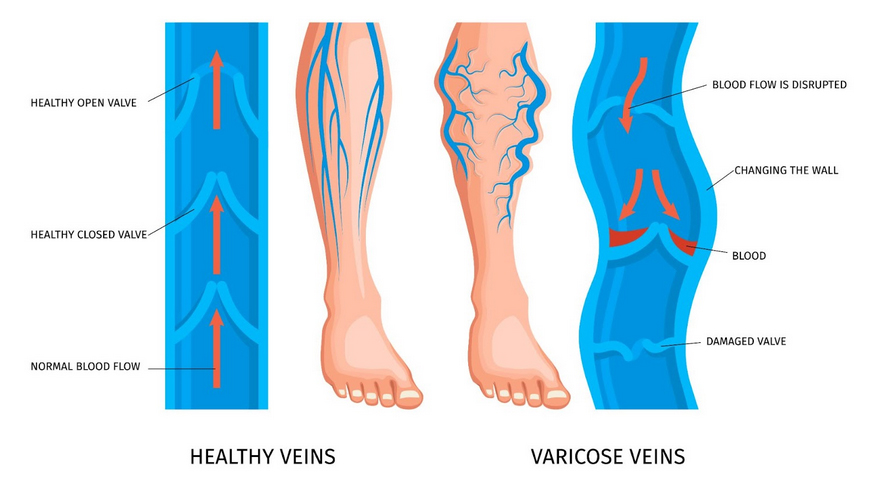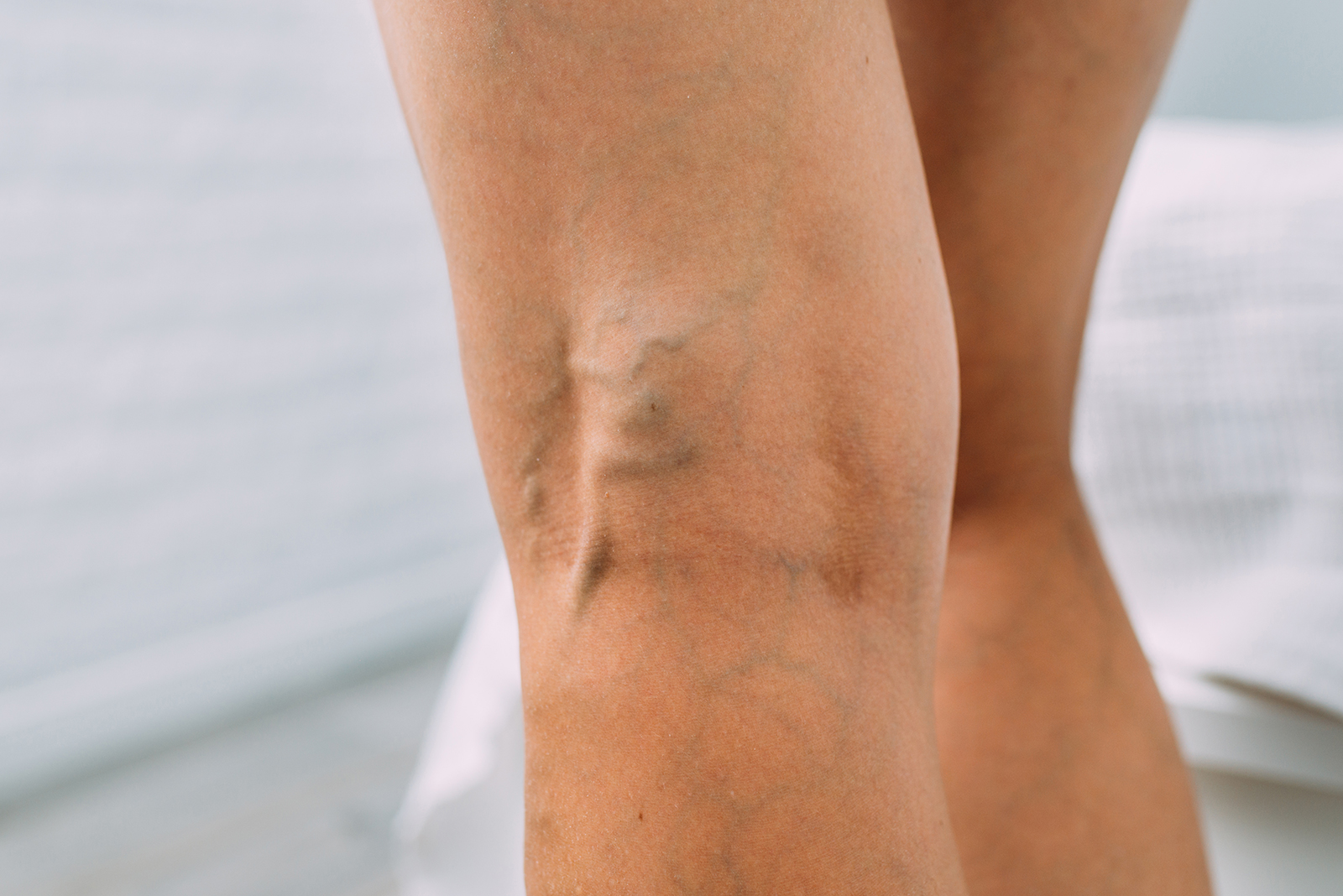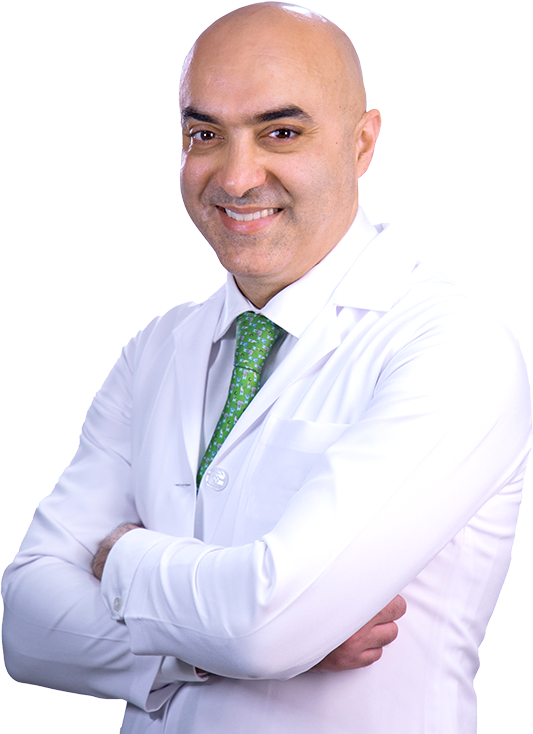Varicose Veins Treatment
What are
Varicose Veins?
Varicose, what is the definition? Varicose veins are enlarged, twisted veins that often appear blue or purple and bulge under the skin. They commonly occur in the legs but can also develop in other parts of the body. What varicose vein means to some patients: discomfort, pain, swelling, and fatigue.
Here is what varicose veins look like >>

Why Do Varicose Veins Occur?

Causes of Varicose Veins
Who gets varicose veins?
- Genetics: A family history of varicose veins increases your risk.
- Age: The risk of developing varicose veins increases with age.
- Pregnancy: Hormonal changes during pregnancy can weaken vein walls.
- Obesity: Excess weight puts pressure on veins.
- Prolonged Standing, Sitting, Exercing: This can hinder blood circulation.
Where Do Varicose Veins Appear?
Varicose veins are commonly located on the legs, particularly in the calves and thighs. However, they can also develop in other parts of the body, such as the esophagus (esophageal varices), rectum (hemorrhoids), and scrotum (varicocele).
Who Needs Varicose Veins Treatment?
While varicose veins are primarily a cosmetic concern, treatment is recommended if they cause significant pain, discomfort, or other symptoms. It’s essential to consult a vascular specialist for an accurate diagnosis and treatment plan.
Symptoms of Varicose Veins
Varicose Veins Myth & Facts
Are Varicose Veins Painful?
Are Varicose Veins Dangerous?
Are Varicose Veins Treatable?
Varicose Veins Treatment Options
in Dubai
Sclerotherapy
This is the most common treatment for how varicose veins can be treated. It nvolves injecting a solution into the vein to cause it to collapse and disappear.
Endovenous Laser Treatment (EVLT)
Radiofrequency Ablation (RFA)
Similar to EVLT but uses heat to close the vein.
Phlebectomy
A surgical procedure to remove varicose veins through small incisions.
Compression Stockings
These can help improve blood circulation and reduce symptoms.
Varicose VeinS Treatment FAQs
The optimal treatment for varicose veins depends on several factors, including the severity of your condition, the location of the veins, and your overall health. Dr. Mazen will carefully assess your individual needs to determine the most suitable approach.
Advanced Medical Technologies: Dr. Mazen Shaheen utilizes the latest and most technology and equipment at his leading Dubai medical clinic to ensure the highest standard of medical care for his patients.
Expert Physicians: With over 2,000 successful varicose vein procedures performed, Dr. Mazen is a highly skilled vascular surgeon providing comprehensive and personalized pre- and post-treatment plans.
Varicose: which doctor to see? Varicose veins are typically treated by a phlebologist, a vascular specialist who focuses on conditions affecting veins. Dr. Mazen, a renowned vascular surgeon, specializes in treating varicose veins and offers advanced treatment options to patients in Dubai.
Treatment duration varies depending on the chosen method and the severity of the condition. Most minimally invasive procedures can be performed in a short outpatient setting.
While the treated varicose veins themselves won’t return, it’s possible for new varicose veins to develop over time. This is because the underlying condition that caused the initial varicose veins often persists. Factors like genetics, lifestyle, and ongoing vein health play a role in the potential for new varicose veins to appear.
The cost of varicose vein treatment in Dubai can vary depending on the chosen procedure, and the extent of the condition. Book your appointment to get an exact quotation.
Finding the Right
Varicose Veins Specialist in Dubai
Experience and Expertise
Choose a physician with extensive experience in treating varicose veins.
Clinic or Hospital Reputation
Opt for a reputable medical facility with advanced technology.
Patient Reviews and Testimonials
Feedback from other patients can be helpful. Check what patients said about getting their varicose vein treatment with Dr. Mazen Shaheen.
General FAQs
While varicose veins in the legs are not directly linked to erectile dysfunction (ED), there’s a related condition called varicocele that can affect male fertility and potentially contribute to ED.
Pregnancy itself doesn’t cause varicose veins, but it often leads to the development or worsening of varicose veins. This is due to hormonal changes and increased blood volume during pregnancy. Treatment is usually delayed until after childbirth as they often improve on their own. Do Varicose Veins Go Away After Pregnancy? Varicose veins often improve or disappear within a few months after pregnancy, but they may persist in some women.
Secure Your Path to Better Heart Health!

